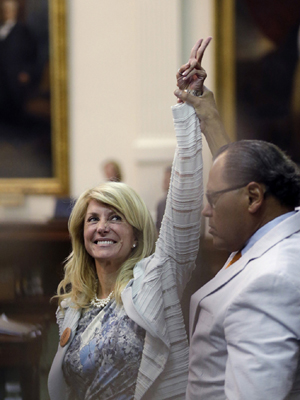
This has not been a good week for American conservatives. First of all, in a historic vote, the US Supreme Court struck down a law that explicitly defined marriage to be between a man and woman only. The Defence of Marriage Act (DOMA) had been in force since 1996, and was now ruled to be unconstitutional by the Court’s 5-4 vote.
Technically DOMA meant that the federal government was banned from recognising same-sex marriages performed in states that have legalised the practice. DOMA has therefore prevented same-sex couples from having access to several federal retirement, tax and health benefits that heterosexual married couples are able to enjoy. The case against DOMA was now brought by Edie Windsor, 84, who had been issued with a federal estate tax bill of $363,000 (£236.800) after inheriting her spouse Thea Spyer’s estate in 2009. She would not have had to pay the levy had she been married to a man.
Justice Anthony Kennedy wrote in the majority opinion: "The federal statute is invalid, for no legitimate purpose overcomes the purpose and effect to disparage and to injure those whom the State, by its marriage laws, sought to protect in personhood and dignity.” President Obama also commented on the decision: "When all Americans are treated as equal, no matter who they are or whom they love, we are all more free."
The conservative spirits were low: "They are rejecting the truth. It's a sad day," said Frank Page, president of the Southern Baptist Convention Executive Committee. Tony Perkins, president of the Family Research Council said: "As the American people are given time to experience the actual consequences of redefining marriage the public debate and opposition to the redefinition of natural marriage will undoubtedly intensify."
Aside from DOMA, the Supreme Court declined to rule on California’s ban on gay marriage, known as Proposition 8. This decision, while obviously not forcing states to adopt same-sex marriage, is likely to pave the way for the legalisation of same-sex unions in California.
Earlier in Texas, the Democratic state senator Wendy Davis spoke for over 10 hours in the state Senate on Tuesday to prevent voting on a bill that would have banned abortions after 20 weeks of pregnancy, limited abortion-inducing drugs and required abortions to be performed in “ambulatory surgical centres”. The Texas senate is controlled by the Republicans, so the law’s passing looked certain. If the bill had become law, the majority of the state’s abortion clinics would have had to close, as they are unable to provide the required surgical services.
The marathon speech, or filibuster, was successful. Sen. Davis was forced to stop after 10 hours and 45 minutes (without sitting down or using the toilet) once she had strayed off the topic for the third time, and the senate erupted in chaos when the midnight voting-time limit was closing in. The senate gallery, filled with pro-choice activists, erupted in cheers which prevented voting in the last minute. The voting could only take place after midnight, which means that the bill cannot proceed to the Texas governor, Rick Perry.
Gov. Perry has nevertheless ordered another special session (usually used for issues that demand immediate decisions, such as transportation or redistricting), which will most likely see the bill passing. Perry commented: "Texans value life and want to protect women and the unborn. Texans want a transportation system that keeps them moving. Texans want a court system that is fair and just. We will not allow the breakdown of decorum and decency to prevent us from doing what the people of this state hired us to do."
Filibustering definitely does not seem like the most democratic measure of dealing with proposed laws, but Sen. Davis’ example shows that the pro-choice movement is alive even in the reddest of the states.

